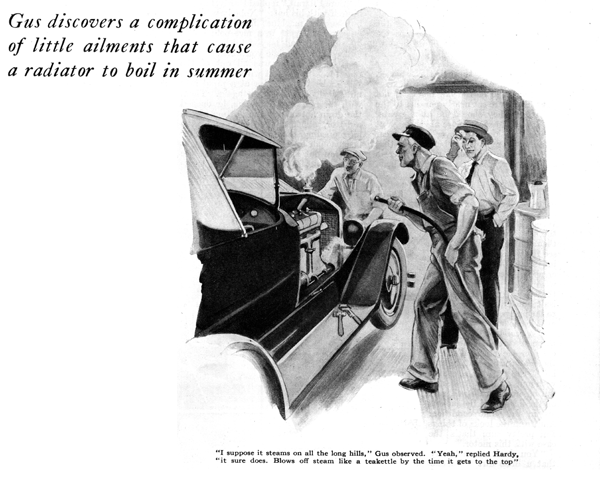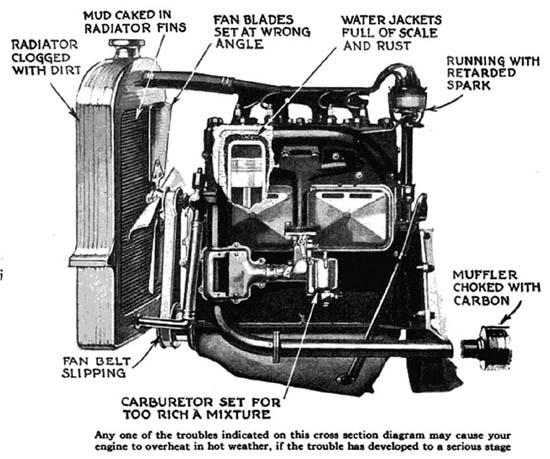August 1927
WHEN YOUR MOTOR SIZZLES
by Martin Bunn

Gus Wilson always insisted that hot weather didn't bother him, but Joe Clark, his partner in the Model Garage, knew better. Whenever the mercury began to flirt with the top of the thermometer, Gus started grumbling.
"I never saw such a lot of picayune jobs!" the old auto mechanic growled as he mopped the perspiration from his brow with a handful of waste. "I'm sick of cleaning the muck out of carburetors, changing spark plugs, putting new bulbs in headlights and going out on trouble calls to find out that some bonehead's motor doesn't 'mote' because he forgot to fill the gas tank!
"See what that bird outside is honking his horn for, Joe. I suppose it's something important -- needs a new hub cap, or something."
"Better go out and have a look at that car, Gus," said Joe a few minutes later.
"He says it overheats, and it sure is hot enough to fry eggs on: but I can't seem to locate the trouble."
"Probably needs a new fan belt," Gus muttered disgustedly as he started for the door.
But Gus's bored expression rapidly changed to one of interest as he progressed with the inspection of the motor in the customer's car. The motor was overheating -- that was quite obvious.
Although it had been stopped for several minutes, heat waves still were rising from it in a shimmering cloud and there was a smell of scorched paint mingled with the odor of hot, oily metal. Yet the fan belt was in place and the radiator appeared to be full of water.
"When did you first notice any trouble, Mr. -- ?" inquired Gus.
"Name's Hardy -- I sell sewing machines," replied the car owner. "If it was a sewing machine that wasn't working right -- bobbin gone wrong, shuttle on the blink or something like that -- I'd know what to do, but this outfit sure has my goat! It'd do fine as a cook stove but it's a total loss as an automobile. I bought it second hand last month and it's been broiling my feet ever since."
"Start it again and let me listen to it," Gus requested.
Hardy stepped on the self-starter and the motor started at once. It ran smoothly without a sign of a miss. Gus opened the filter cap on the radiator and squinted down the hole. "Speed her up a bit," he said.
Apparently satisfied with what he saw, Gus closed the radiator cap. Then, after the motor had been running for several minutes, he felt all over the front of the radiator and proceeded to place his hand on various parts of the cylinder block and cylinder head.
"I suppose it steams on all the long hills," Gus observed.
"Yeah, it sure does," replied Hardy. "Blows off steam like a teakettle on a rampage by the time it gets to the top. I have to fill the radiator with water every time I get gasoline."
"There's a hill right near here," Gus suggested. "I'd like to see how it acts,"
"Hop in, "said Hardy, "you won't get cold feet in this car at any rate."
But Gus had forgotten the heat for the time being. He was too much absorbed in finding the cause of the over-heating, and so he carefully observed the way in which the car accelerated and appeared to be listening intently for queer noises. They started up the hill in good style. About half way up the water began to boil, and a few hundred feet further on the motor developed a hollow ringing knock that seemed to come from only one cylinder.
"Better stop and let it cool off a bit," Gus advised when they reached the top of the hill. "Then we can go back," he added. "I know what's wrong. It's what the doctors call a complication of diseases."
"That means a hopping big repair bill," groaned Hardy, "and I haven't sold a single sewing machine this week. About how much is it going to set me back?"
"Don't worry," said Gus with a smile. "You can have a powerful lot of things fixed on an automobile for a few dollars if they are all little items. And all of yours are.
"I don't remember ever having run into such a queer combination," continued Gus. "Not one of the things that are wrong with this car would amount to anything by itself. But each one has a tendency to cause overheating, and working together they sure have put the motor on the bum.
"There's nothing radically wrong with the cooling system. Barring one particular trouble, it's just a sort of general let down in operating efficiency. Take the radiator, for instance. It looks clean enough -- if you just glance at it. But if you inspect it carefully you'll notice that a lot of dirt is caked in the openings.
That dirt has two bad effects. First, it cuts down the amount of air that the fan can suck through the radiator. Second, it prevents the air from touching the actual metal surface, and so keeps the radiator from getting rid of its heat to the air. The fan belt is slipping because it's too loose, and that still further slows down the air flow through the radiator. And I think a measurement will show that the angle of the fan blades is not right. They are set nearly parallel to the radiator. They should be at a greater angle so as to scoop more air through at each revolution. Whoever had the car before you must have bent them that way to make the motor run warmer in cold weather, and then he forgot to bend them back again in the spring.
"The pump seems to be working all right. When I looked in the filler opening in the radiator, I could see the water whirling around, due to the increased speed of the pump when you stepped on the throttle. And there really isn't much that can happen to the pump, anyway, as long as it keeps on working at all. But circulating the water through the radiator and cylinder jackets won't keep the motor from getting too hot if the radiator is coated with mud on the outside and full of muck, scale and rust on the inside and the jackets are in the same condition.
And from the looks of things I'm pretty sure that's the case with this motor."
"You don't mean to say that a little dirt will make any car overheat as bad as this one does, do you?" exclaimed Hardy skeptically.
"Not by itself, perhaps," admitted Gus, "but there are other things wrong.
Your carburetor is set for a rich mixture. The spark doesn't advance as far as it should, and I'm certain that the muffler is choked with carbon. Those three things would be enough to cause a little overheating on a warm day, even if nothing was wrong with the cooling system."
"When the motor gets real hot there's a funny knock," said Hardy. "Has that got anything to do with the cooling system?"
"Probably," replied Gus. "Maybe the dirt in the water jacket has collected over one cylinder to such an extent that the head overheats at that point. Or perhaps some of the holes between the cylinder jacket and the head jacket are stopped up. That would keep the water from circulating over that particular head and it would naturally get hotter than the others. We'll see what happens when I flush it out."
By this time they had arrived back at the garage and Gus got busy at once.
"It'll probably take at least an hour, Mr. Hardy; do want to wait?" Gus inquired as he started to drain the radiator preparatory to flushing it out with a strong solution of lye.
"Sure I'll wait," replied Hardy, fanning himself with his hat. "Nobody wants to buy sewing machines in this weather, anyway. I'll get me a nice cold bottle of soda pop and maybe take a snooze under that tree while you work!"
After the water was all out of the radiator, Gus filled it with the lye solution and ran the motor at a rapid rate until it had warmed up again. Then with the motor still running, he opened the drain petcock at the bottom of the radiator, stuck the water hose in the filler opening, and turned on the water fast enough to make up for the amount that ran out at the drain cock. At the end of about fifteen minutes of this treatment, the water that issued from the bottom was perfectly clear, indicating that all the dirt that had been in the cooing system was out, or at least as much of it as could be removed by that particular method of cleaning.
"I hope it got the dirt out of that clogged-up cylinder head," Gus muttered to himself. "If it didn't, I'll have to take the cylinder head off."
With the inside of the system cleaned out, Gus set to work to clean the crusted mud out of the radiator fins. He put the nozzle on the hose and set it to squirt a solid stream about the size of a pencil. Then he shot the stream through the openings in the radiator from the inside so that the water and the dirt it dislodged would be thrown out at the front.
Bending the fan blades so that they would pull more air took only a moment, and then Gus examined the fan belt.
"I could tighten it up and it would run all right. I suppose," he thought. "Still, it's worn to a frazzle, and it'll soon give out anyway. Guess I'll put in a new one."
Gus tackled the ignition next. He found that one of the coated levers had become bent so much that it didn't push the timer case around far enough when the spark was advanced.
"A chimney sweep would feel right at home on this job!" Gus exclaimed as he started cleaning out the muffler. But a stiff wire brush enabled him to finish the disagreeable work in a short time.
"All ready for a test, Mr. Hardy," Gus called a few minutes later to the sewing machine salesman who was snoring peacefully under the tree.
Once more Gus climbed in behind the wheel and they headed for the test hill.
This time the car arrived at the top without any sign of boiling. The lye evidently had done its work and opened up the clogged passages in the cylinder head, because the knock also had disappeared.
"There's one point you ought to remember, Mr. Hardy," Gus suggested. "The motor got up this hill without boiling, but if the hill had been twice as long it probably would have boiled if I had kept it in high gear. When you get on a steep, long hill in hot weather, especially when you are driving with the wind, you'll find that the motor will stay a whole lot cooler if you shift to second instead of trying to go all the way up in high. There's two reasons why the motor cools better in second speed under such conditions. One is that the motor turns over faster and the fan consequently pulls more air through the radiator. The other is that the pump circulates more water through the cylinder jackets, and carries off the heat much more quickly."
"I thought I heard you say you were tired of picayune jobs," grinned Joe Clark to Gus after Hardy had departed.
"Humph!" growled Gus. "My idea of a picayune job is one that anybody can do. The ones on that car had you stumped!"
END
L. Osbone 2019
